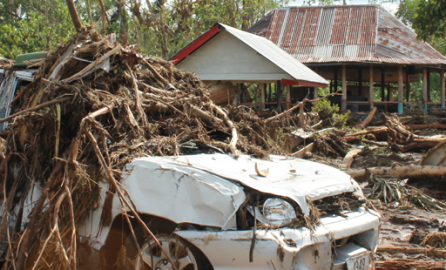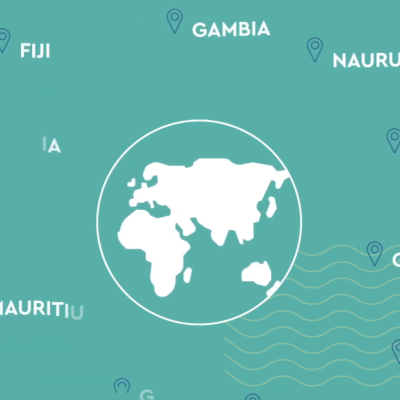They might not make global headlines, but for low-lying Pacific islands king tides are an ever-increasing threat. As sea levels rise, the highest tides can have catastrophic effects, particularly when combined with storm conditions.
In December 2012, eight people died and 20,000 homes were destroyed when Tropical Cyclone Evan caused flash flooding in Fiji, Samoa and the Solomon Islands, among others.
And in March this year, the capital of the Republic of the Marshall Islands, Majuro, was flooded for the third time in 12 months. Several homes were destroyed and almost 1000 people sought shelter in temporary relief centres.
The aftermath of flash flooding caused by Cyclone Evan on the village of Lelata. Photo: Kevin Hadfield/AusAID
More than half of Pacific Islanders live within 1.5 kilometres of shore.
In such a precarious environment, it is critical that inhabitants receive flood warnings as soon as possible. According to Professor Elisabeth Holland, Professor of Climate Change and Director of the Pacific Centre for Environment and Sustainable Development at the University of the South Pacific, radio remains the best way to get the word out early.
“This is a region where radio is still a very effective means of communication because they are battery powered, they don’t require an electrical grid.”
The Secretariat of the Pacific Regional Environmental Programme (SPREP), the body responsible for environmental protection in the Pacific, is also integrating meteorological forecasting with mobile phones to facilitate warnings by text message.
In Brussels recently for the Second Regional Technical Meeting of the Global Climate Change Alliance* Intra-ACP Programme, Prof. Holland highlighted the European Union’s funding for cell phone networks on outer Pacific islands where it is not profitable for commercial carriers to provide coverage.
Limited access to adaptation finance
According to Prof. Holland, accessing climate finance has proved difficult in the Pacific. SPREP has just been approved as a Regional Implementing Entity to receive direct transfers from the global climate Adaptation Fund, but no Pacific country has yet fulfilled the requirements to be a National Implementing Entity.
Preparing new generations for climate change
The University of the South Pacific offers a number of postgraduate qualifications in climate change, and 30 percent of its 282 postgraduate students are already employed by national governments, NGOs or the private sector.
“Part of capacity building is hiring the most talented students, the best trained students for the projects that you are implementing,” Prof. Holland says. Given the large distances between islands many people choose to study online.
Prof. Holland explains that students act as intermediaries, combining modern science with age-old local knowledge held by older generations about how the islands once looked. In fulfilling this role, she and her colleagues found students lacked not skills but confidence.
“We had to find some ways of supporting them to build that confidence that they [graduate] with presentation skills, some negotiation skills, and confidence in their ability to do things.”
The poetry of the Pacific
One young woman seemingly not lacking in confidence is Kathy Jetnil-Kijiner from the Marshall Islands. Her oral poetry highlights the threats posed by climate change, as well as the legacy of nuclear tests in the Pacific.
A video of her performing her poem ‘Tell Them’, about rising sea-levels, is here.
“It is the best description of the impact at that heart level, at the soul level, of what it could mean to be separated from the place that you regard as home,” Prof. Holland says.
“That piece of poetry, woven together with some of the science of sea-level rise and the various cultural pieces, became Moana: The Rising of the Sea. That was a full-scale production that included dance, song [and] poetry that was premiered at the University of the South Pacific with European Consortium for Pacific Studies (ECOPAS) funding in December.”
The same production will feature at the UN Conference on Small Island Developing States in Samoa this September.
A recent blog post by Ms Jetnil-Kijiner may also contain lessons for development practitioners as she describes why her oral poetry – also known as SLAM poetry – reached a wider audience than other works published in a local newspaper.
“Our culture is essentially an oral culture – we’re great listeners, but reading and writing is still a bit of an isolated skill set. Spoken word, however, is able to bridge that gap between storytelling and poetry.”
|
The GCCA was launched by the European Union in 2007 to improve dialogue and cooperation with developing countries in adapting and mitigating the effects of climate change. The programme is managed by the European Commission Directorate General for Development and Cooperation – EuropeAid. The Intra-ACP Programme is a component of the GCCA which specifically targets the African, Caribbean and Pacific group of states, helping them to better tackle climate change as a challenge to their development. It has a strong focus on improving the understanding of the effects of climate change and contributing to adaptation and mitigation responses. Managed by the ACP Secretariat in Brussels, the programme provides technical assistance and training on climate change mainstreaming and finance to ACP member states. The Second Regional Technical Meeting of the GCCA Intra-ACP Programme explored and identified ways to improve the exchange of information, synergies and improve cooperation and coordination among the ACP regions, and between the regions and the ACP Secretariat. Participants discussed topics such as how to prepare new generations for climate change, and the challenges of obtaining funds required for adaptation and mitigation strategies. For more information see:
|
This article is based on an Info Point presentation organised by the Global Climate Change Alliance Intra-ACP on ‘Educating a New Generation of Climate Change Professionals in the South Pacific’.
This collaborative piece was drafted with input from Michel Jambou, Laura Giappichelli (EuropeAid) and Pendo Maro (ACP Secretariat), with support from the capacity4dev.eu Coordination Team. Teaser image courtesy of Rachel Nankivell.




Log in with your EU Login account to post or comment on the platform.